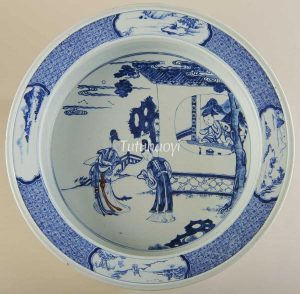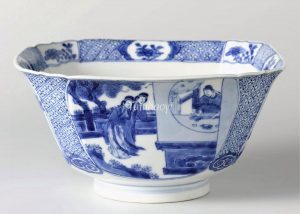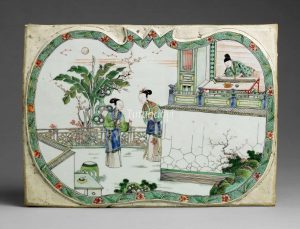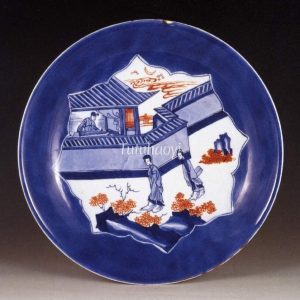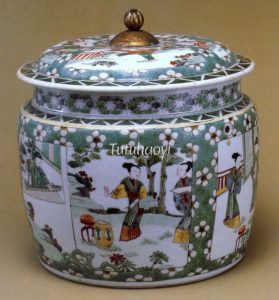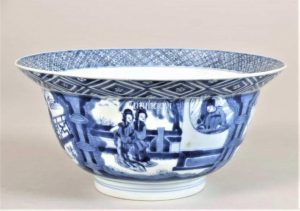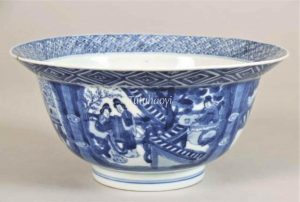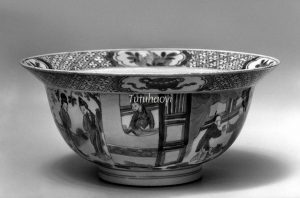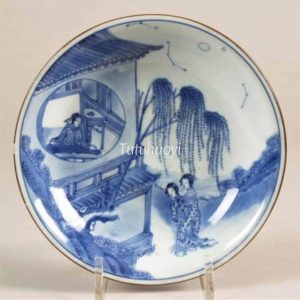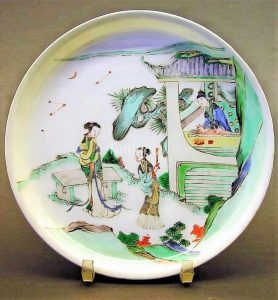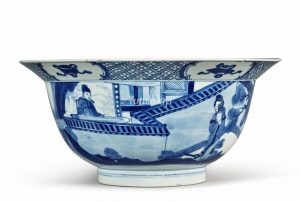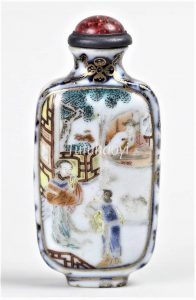Yingying listening to the qin zither playing
莺莺听琴 (琴心写恨)
© Tutuhaoyi.com owns the copyright of the description content for the images attached. Quoting all or part of the description content on this page is permitted ONLY IF ‘Tutuhaoyi.com’ is clearly acknowledged anywhere your quote is produced unless stated otherwise. (本页描述内容版权归Tutuhaoyi.com所有,转发或引用需注明 “Tutuhaoyi.com”, 侵权必究, 已注开源信息的条目除外。)
This is Scene Five of Act Two of the Chinese classic popular drama Romance of the Western Chamber (西厢记 Xixiang ji).
At a family dinner party, Zhang Junrui’s (张君瑞, also called Scholar Zhang 张生) dream of marrying Yingying (莺莺) the love of his life was shattered by Yingying’s mother because he was a nobody with no respectable official’s position.
This drove him to thoughts of suicide. He tried to drown his sorrows in alcohol, and had to be supported by the maid Hongniang (红娘) to return to his own quarters. His desperation moved Hongniang. She suggested that he express his passion through a performance of the qin zither and she would arrange for Yingying to hear it on their way to their incense-burning ceremony in the evening.
When Yingying was led to pass Scholar Zhang’s quarters, Hongniang coughed to send Zhang a signal, in line with their secret prior arrangement. Zhang started to pour his heart out through the enchanting music that his deft fingers were playing. It did the trick: Yingying’s heart was melting!
image identification and story scene description by Dr Yibin Ni
Other episodes in the Romance of the Western Chamber:
Scholar Zhang Embarking on His Journey to Sit for Civil-Service Examinations 张生赶考
Sun Feihu besieging the monastery with a gang of bandits 彪贼起兵 (乱倡绿林)
Farewell feast at the pavilion 长亭送别 (哭宴)
Fig 1: porcelain basin with underglaze blue decoration, Kangxi period (1662–1722), Qing dynasty, courtesy of the Sir Michael Butler Collection
Fig 2: porcelain bowl with underglaze blue decoration, Kangxi period (1662–1722), Qing dynasty, courtesy of Rijksmuseum, Holland
Fig 3: porcelain plaque with overglaze enamelled decoration, Kangxi period (1662–1722), Qing dynasty, courtesy of The Guimet Museum, Paris – National Museum of Asian Arts. G5197.
Fig 4: porcelain plate with underglaze blue and red decoration, Kangxi period (1662–1722), Qing dynasty, courtesy of the Chinese Ceramics Museum, Jingdezhen, Jiangxi province, China
Fig 5: porcelain lidded jar with overglaze enamelled decoration, Kangxi period (1662–1722), Qing dynasty, courtesy of Palace Museum, Beijing, China
Fig 6-7: two porcelain bowls with underglaze blue decoration, Kangxi period (1662–1722), Qing dynasty, courtesy of Princessehof Ceramics Museum, Leeuwarden, The Netherlands
Fig 8: porcelain bowl with underglaze blue decoration, Kangxi period (1662–1722), Qing dynasty, courtesy of the Metropolitan Museum of Art, New York
Fig 9: porcelain dish with underglaze blue decoration, 1644–1666, courtesy of Princessehof Ceramics Museum, Leeuwarden, The Netherlands
Fig 10: porcelain plate with overglaze enamelled decoration, Kangxi period (1662–1722), Qing dynasty, courtesy of the Marc Michot Gallery
Fig 11: porcelain bowl with underglaze blue decoration, Kangxi period (1662–1722), Qing dynasty, courtesy of the Sotheby’s Auction House, New York, 22 June 2021, Lot 34
Fig 12: porcelain snuff-bottle, Jiaqing period (1796–1820), Qing dynasty, courtesy of Princeton University Art Museum, object number: y1936-991
